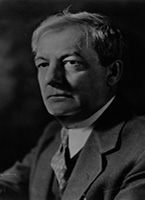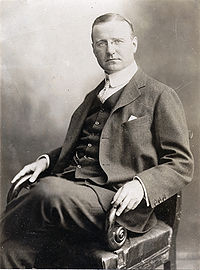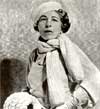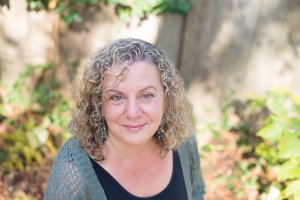
Dina Elenbogen
Born:
Connection to Illinois: Elenbogen lives in Evanston. Biography: Dina Elenbogen is an award-winning poet and prose writer. She holds a poetry MFA from the University of Iowa and teaches creative writing at the University of Chicago's Graham School. Her poetry has appeared in numerous anthologies and literary magazines including City of the Big Shoulders (University of Iowa, press), Brute Neighbors: Urban Nature Poetry, Prose, and photography (De Paul Humanities Center), Beyond Lament (Northwestern University Press), Without a Single Answer: Poems on Contemporary Israel (Judah Magnes Museum Press), 100 Jewish Poems of the New Millenium Ashland Poetry Press), Sarah's Daughters Sing (Ktav Publishers), and magazines such as Prairie Schooner, December Magazine, Connectcticult River Review, Naugatuck River Review, Calyx, Poet Lore, Rhino, Paterson Literary Review, Voices Israel and numerous others. Her poem "A Jew in Vienna" was the recipient of the Miriam Lindberg Israel Poetry for Peace Prize. Elenbogen's essays have appeared in magazines including Lit Hub, The Examined Life Journal, Brevity, Tikkun, Chicago Reader, New City, Midstream, Quintesstentially New Trier, Sheridan Road Magazine, JUF News, The Times of Israel, Chicago Jewish News and the anthology Word by Word: The Iowa Writer's Workshop 75 Years (University of Iowa Press). Her fiction has appeared in the anthology, Nice Jewish Girls: Growing Up in America, (Penguin/Plume), Hadassah Magazine, Bellevue Literary Review, and the anthology Where We Find Ourselves (SUNY Press, 2009.)
Awards:
LinkedIn: https://www.linkedin.com/in/dina-elenbogen-99aa42a
Twitter: https://twitter.com/Dina%20Elenbogen
Web: https://www.dinaelenbogen.com
WorldCat: http://www.worldcat.org/search?q=Dina++Elenbogen
Selected Titles
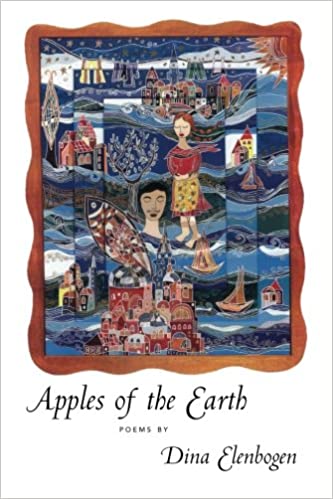 |
Apples of the Earth ISBN: 1933132248 OCLC: 61130734 Spuyten Duyvil New York City : 2005 Apples of the Earth is a marvelous first collection. In elegant, luminous language, Elenbogen evokes the places and people she loves and grieves over. Her leaps of imagination are startling: in one deft instant, she can connect commonplace objects to motions of the spirit and the heart. Her tone is everywhere sure and clear, the voice of a born poet. --Lynn Sharon Schwartz, author of The Writing on the Wall |
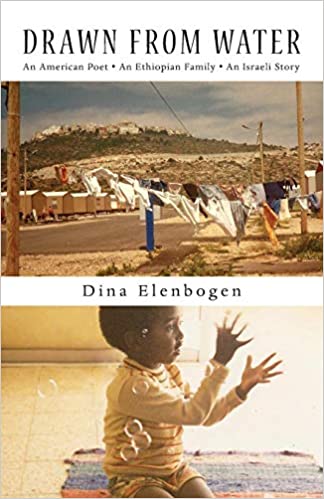 |
Drawn From Water: An American Poet, An Ethiopian Family, an Israeli Story Paperback ISBN: 1886157979 OCLC: 902854270 BkMk Press at the University of Missouri-Kansas City 2015 Literary Nonfiction. African & African American Studies. Jewish Studies. Middle Eastern Studies. What do we mean by home? In DRAWN FROM WATER, American Jew Dina Elenbogen explores her thirty-year friendship with Ethiopian Jewish immigrants in Israel as they struggle in a new country while dealing with her own desire to join them there. Thirty years ago, Operation Moses airlifted thousands of Ethiopian Jews to Israel, where today they, immigrants from other years, and descendants form a community over 100,000 strong. Through the stories of the children Osnat, Elad, and their siblings, Elenbogen raises questions about religion, assimilation, and cultural identity. The author's poetic voice examines immigration in all its forms, success and failure, adaptation and resistance. Black Ethiopians suffer discrimination, and are hindered by cultural and language difficulties, yet the children eventually attend college, marry, and have families of their own. Dina's personal journey parallels theirs, but poetry and the arts give her a bridge between her life in America and her desire for Israel. |
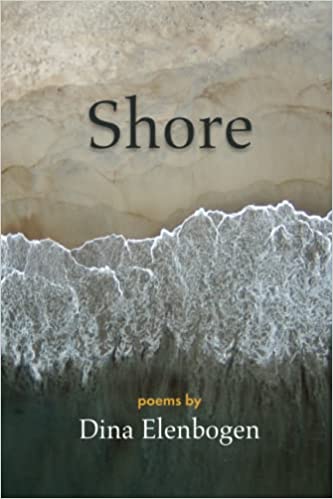 |
Shore: poems by Dina Elenbogen ISBN: 1941783945 OCLC: Glass Lyre Pres 2023 Shore, Dina Elenbogen’s ambitious new book, speaks about and stands up against a global pandemic of violence, bearing witness both to the suffering and loss in our world, but also to the healing power of family, faith, community, nature, and, most profoundly, words. In one poem, Elenbogen offers this plea: “Dear language / Don’t abandon us just yet / the icicles have melted / words are our only weapon”—a weapon we can wield to secure, for all of humanity, a sense of safety, rootedness, and hope. As we move through the richness of these poems, we encounter such haunting beauty—daffodils that “bow down and weep,” mother birds who “take the names of angels,” the “tinted windows of history” in our own mothers’ nostalgia, and ultimately a “holiday of plagues”—and arrive, uplifted and inspired, at a place of stillness where “something deeper than love” can be found. —Faisal Mohyuddin, author of The Displaced Children of Displaced Children |


